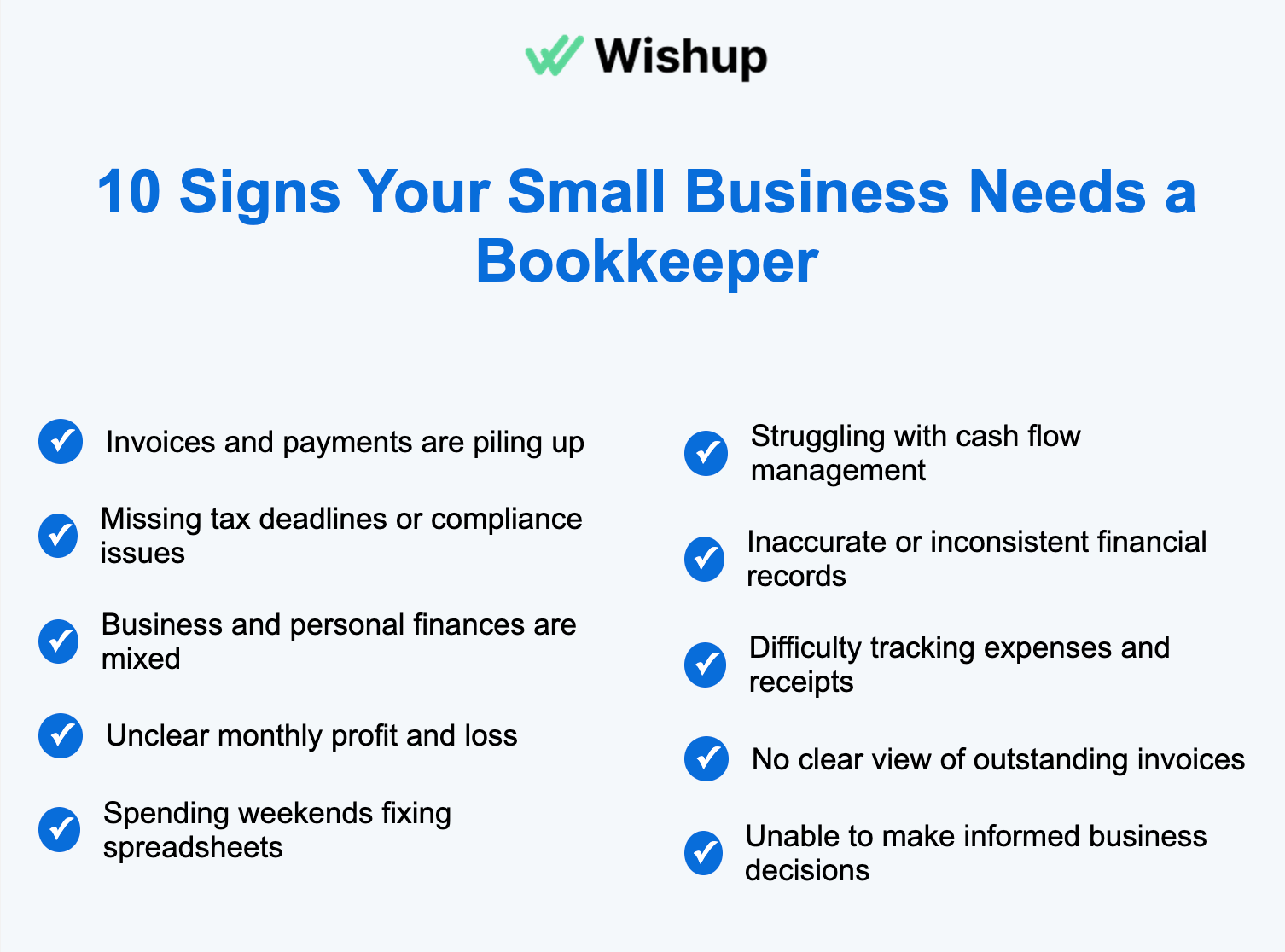How Much Does a Bookkeeper Cost for a Small Business in 2025?
Discover the real cost of hiring a bookkeeper in 2025. Find out what’s worth paying for and where you can save.

You need a bookkeeper, but you’re unsure how much it should cost, what affects the price, or whether you should hire locally, outsource, or go virtual.
On top of that, you worry about wasting money or getting scammed. One wrong hire could drain your budget, cause errors, or make tax season a nightmare. You want a solution that’s affordable, trustworthy, and tailored to your small business, without unnecessary overhead.
In this guide, we’ll break down exactly how much a bookkeeper costs for a small business, what drives those costs, and how to choose the right bookkeeping option that keeps your finances accurate, stress-free, and under budget.
Table of Contents
- How Much Does a Bookkeeper Cost for a Small Business?
- • Bookkeeper hourly rates vs monthly rates – which is better?
- • Who should choose hourly bookkeeping plans?
- • Who should choose monthly bookkeeping plans?
- • Bookkeeping cost breakdown by business size
- Factors that influence bookkeeping costs
- How to budget for small business bookkeeping in 2025?
- Hire a Bookkeeper for Your Small Business in 60 Minutes
How much does a bookkeeper cost for a small business?
The cost for a small business bookkeeper typically ranges from $704 to more than $3000 per month, depending on the service, transactions handled, location, and experience of the bookkeeper. You can hire bookkeepers on a monthly basis, project basis, hourly basis, or even a full-time in-house bookkeeping staff.
Here’s a comprehensive and latest 2025 comparison table showing different ways small businesses can pay for a bookkeeper:
Bookkeeper hourly rates vs monthly rates - which is better?
For small businesses, monthly bookkeeping packages offer far better ROI. Hourly can feel cheaper upfront, but frequent tasks quickly add up and can end up more expensive than a monthly plan. With monthly bookkeeping plans, you get consistent, ongoing support.
Who should choose hourly bookkeeping plans?
You can choose hourly bookkeeping plans if
- Your bookkeeping needs are sporadic or seasonal.
- You want to control costs tightly and pay only for actual hours worked.
- You’re testing a new bookkeeper or small business processes.

Who should choose monthly bookkeeping plans?
You can choose monthly bookkeeping plans if
- You need continuous support for invoices, reconciliations, payroll, or tax preparation.
- You want predictable budgeting.
- You want to tackle out-of-the-box budgeting problems at the same cost.
- You value a dedicated professional integrated into your workflow.
Bookkeeping cost breakdown by business size (solo, small team, growing startup)

Factors that influence bookkeeping costs
Frequency of service (daily, weekly, monthly)
How often you need bookkeeping directly affects cost. Daily tracking works well for fast-moving businesses with lots of transactions — e-commerce, cleaning, or service companies with multiple clients. Weekly or monthly services suit businesses with predictable cash flow and fewer transactions. The key is matching frequency to transaction volume: overpaying for daily services when monthly suffices is wasted money.
Complexity of transactions and accounts
Not all bookkeeping is equal. Multiple revenue streams, recurring subscriptions, inventory tracking, vendor payments, and international transactions all add complexity. The more accounts, currencies, or tax rules involved, the higher the bookkeeping effort — and cost. A small business with a single service line has simpler needs than one managing e-commerce, payroll, and loans simultaneously.
Software and tech stack used (QuickBooks, Xero, Zoho, etc.)
The bookkeeping platform impacts cost, efficiency, and accuracy. Cloud-based software with integrations (like QuickBooks or Xero) can reduce manual work, making virtual or managed bookkeeping cheaper. Legacy systems or manual spreadsheets increase hours needed, raising costs. Choosing a bookkeeper experienced with your preferred tech stack avoids onboarding delays and hidden inefficiencies.
Location — local vs. remote bookkeepers
Where your bookkeeper is based affects rates, communication, and availability. Local bookkeepers often charge more but provide face-to-face interaction, which can help with compliance-heavy industries. Remote or virtual bookkeepers leverage cost arbitrage without compromising quality, especially with managed platforms that train and embed assistants in your business. Location also affects response time — consider timezone overlap for urgent needs.
How to budget for small business bookkeeping in 2025?
Here are some proven smart tips to budget your bookkeeping without incurring severe loss.
What percentage of revenue should go to bookkeeping?
For most small businesses, 2–5% of monthly revenue is a practical benchmark for bookkeeping expenses. Solo entrepreneurs or freelancers with simple finances might stay closer to 2%. Small business teams with payroll, multiple revenue streams, or recurring clients may need 4–5%.
Remember this good rule of thumb: budget based on transaction volume, not just revenue.
For example, a small cleaning business with $20k/month revenue but 200 transactions needs more bookkeeping time than a $25k/month service business with 20 transactions. Align your budget to your actual bookkeeping workload, not just a flat percentage.
"Many small business owners overbudget upfront and underutilize bookkeeping resources. Start with a realistic percentage, then adjust once you see the hours your bookkeeper actually needs each month."
How to reduce bookkeeping expenses without compromising quality?
Hire stringently vetted, experienced bookkeepers
Onboard proven bookkeepers with 3-5 years of experience. You are dealing with important numbers, so don't allow beginners to mess it up. An experienced bookkeeper can spot red flags easily and save you from potential losses.
Managed VA platforms like Wishup pre-vet every bookkeeper across 6 rounds through skill tests, accounting simulations, and real-world business scenarios, so you directly get experts who don’t need hand-holding.
Hire bookkeepers from India — top-tier quality, lower cost
Bookkeepers from India bring an unbeatable mix of affordability and analytical strength. Thanks to India’s STEM-driven education system, professionals are trained for precision, data accuracy, and financial logic. You pay 40–60% less than U.S. or U.K.-based hires but still get error-free bookkeeping. Hiring bookkeepers from Phillipines may still cost low, but they are neither as skillful as Indian bookkeepers nor are they well-versed with US tax laws.
Go for monthly plans, not hourly gigs
Hourly bookkeeping feels cheaper until you’re hit with overages for every small update or correction. A monthly plan gives you predictable costs, better engagement, and flexibility to handle sudden tasks like reconciling accounts mid-week or preparing financial reports last-minute. Everything gets covered in the same rate. It’s the best ROI structure for small businesses with dynamic cash flow.
Hire bookkeepers with AI automation expertise
2025 bookkeeping isn’t about manual entry anymore. Leverage automation smartly. Look for professionals who can integrate tools like Dext, QuickBooks AutoEntry, or Zapier workflows to cut repetitive work. A tech-savvy bookkeeper can easily automate 30–50% of tasks involved in a small business. Wishup bookkeepers are trained on 120+ AI and no-code tools over a period of 8-weeks to delivery efficient and on-time bookkeeping for their small business clients.

Hire a bookkeeper for your small business in 60 minutes from Wishup
Conduct unlimited FREE interviews with Wishup's 500+ bookkeepers and hire a bookkeeper for your small business. From background verification to handling payroll, Wishup takes care of everything. You can just hire a bookkeeper in 60 minutes.
🚀 Meet Wishup in 30 Seconds
Wishup is a US-based (Delaware) virtual assistant company that offers remote virtual assistants to busy founders and executives worldwide. Our trained VAs handle everything from admin tasks to specialized work, helping you focus on what truly matters.
- ✅ 10+ years in the industry
- ✅ 1,500+ founders served across 50+ industries
- ✅ 200+ skill areas, 70+ no-code tools, 50+ AI tools
- ✅ Clients from Harvard and Y Combinator-backed startups
- ✅ Onboards trained VAs in just 60 minutes
- ✅ 98.8% client satisfaction | 99% on-time delivery
- ✅ Top 0.1% talent only – pre-vetted & ready to start
- ✅ 6-step vetting process (aptitude, cognitive, English, and more)
- ✅ Flexible plans starting at $9.99/hr — no long-term contracts
- ✅ 7-day money-back guarantee
- ✅ Lifetime satisfaction guarantee

Jitin Kakkar
A Chartered Accountant with a strong passion for diverse areas of Finance and Accounting, recognized for a solid theoretical foundation in Ind AS, IFRS, and US GAAP, and proven practical expertise in financial reporting, analysis, and forecasting. Highly motivated and continually seeking to expand capabilities and deliver impactful financial insights.
More posts by Jitin → · Connect on LinkedInFAQs on Bookkeeper Costs
1. What’s the cost of bookkeeping for a startup with less than 10 employees?
For most small startups with around 10 employees, bookkeeping costs range from $300 to $800 per month, depending on how complex your finances are. Here are key factors that determine the cost:
- Transaction volume: More transactions = more time = higher cost
- Payroll complexity: Multiple employees or contractors add to the workload
- Subscription cost of accounting software: QuickBooks, Xero, or Zoho Books adds ~$20–$70/month
- Location: US-based bookkeepers charge more than India-based ones.
- Reporting needs: Financial reports and tax filings can influence the cost.
Tips to hire a bookkeeper for your startup with fewer than 10 employees:
- Start small. You can always scale bookkeeping support as your startup grows.
- Choose a bookkeeper familiar with startup accounting tools like QuickBooks, Stripe, Gusto, Zoho Books etc.
- Ask for transparent pricing (flat rate vs. hourly). It is recommended not to spend more than $10 per hour.
- Confirm if they include monthly financial reports and tax preparation support.
- Hire virtual bookkeepers with small business experience for flexibility and savings.
Where can you hire a bookkeeper for your startup with less than 10 employees?
Wishup has 800+ experienced virtual bookkeepers for startups and small business with fewer employees. Wishup bookkeepers are also trained on 120+ AI tools automate your bookkeeping operations. You can conduct unlimited FREE interviews and hire your virtual bookkeeper in 60 minutes.
